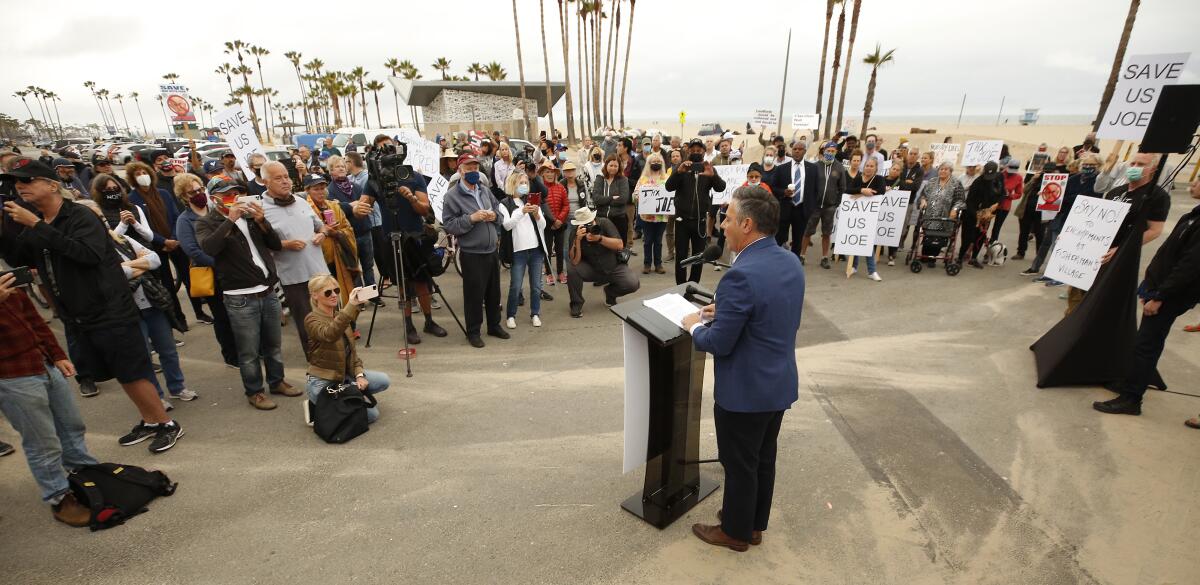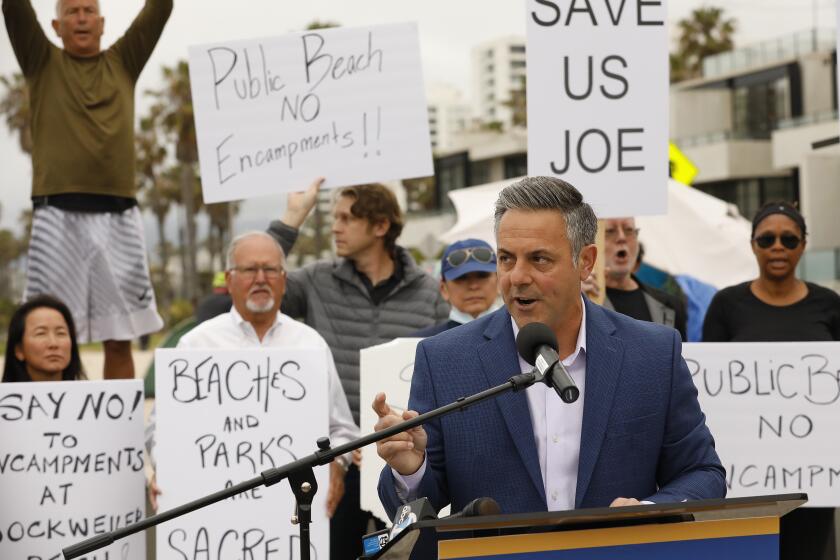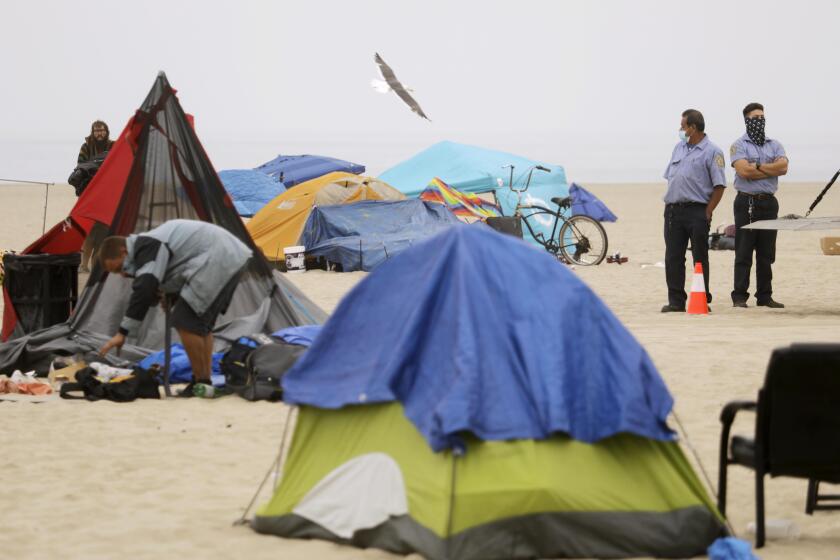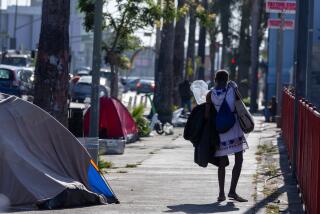Buscaino aims for November 2022 for anti-camping ballot measure after council defers action

If Councilman Joe Buscaino wants Los Angeles voters to decide whether to bar homeless encampments in public spaces, he may have to gather tens of thousands of voter signatures first.
The City Council on Tuesday deferred a decision on whether to place his “Safer and Cleaner L.A.” measure — which would prohibit people from sleeping or camping on sidewalks and other public spaces if they have turned down offers of shelter or emergency housing — on the June 2022 primary ballot.
Instead of approving or rejecting the proposal, the council voted 11-2 to refer it to the council’s Homelessness and Poverty committee.
Buscaino — who is running for mayor — has previously vowed to collect the nearly 65,000 voter signatures necessary to put the measure before voters in 2022 if the council declines to do so.
The council still has several months to decide whether to move forward with the proposal for the June ballot. But that’s unlikely to happen, given that Buscaino’s ballot measure committee has announced plans to begin collecting signatures for the November ballot.
“We’re effectively saying that we’re going to collect the signatures. So we’ve communicated our next move,” Michael Trujillo, Buscaino’s campaign spokesman, said Tuesday afternoon. Trujillo said the ballot measure committee will likely begin signature gathering in January and plans to utilize both volunteer and paid signature gatherers.
Buscaino sharply criticized his City Council colleagues in a campaign email sent Tuesday afternoon from his ballot measure committee, saying that they “showed today that they are more interested in the right to sleep on the sidewalk than the right to housing.”
During a lengthy discussion before the City Council vote, some council members opposed the measure on its face while others said they felt a ballot measure that had not gone through council committees was not the way to move forward, particularly when the city had already implemented a new anti-camping ordinance in recent months.
“The reason that we need to send this to committee is because we don’t have before us anything to vote on,” Councilman Paul Krekorian said. “And if we had before us a policy that had been worked through and thought through, then yeah, maybe we could cast a vote. But we don’t.”
Summarizing the opinions of several of his colleagues, Councilman Gil Cedillo described the ballot measure proposal as “not yet cooked.”
While voicing his opposition, Councilman Mike Bonin characterized the ballot proposal as “focusing on the wrong problem,” saying that it focused on enforcement rather than addressing the whole situation.
Buscaino, who is running for mayor, said he intends to ask his colleagues to place his proposal on the June 2022 ballot, one where he also plans to appear as a candidate.
The ballot proposal would amend the city administrative code to give the mayor additional land use authority during a declared state of emergency related to homelessness. It would include the ability to waive land-use code and zoning regulation requirements “as necessary to urgently site homeless housing projects,” according to the motion.
The council decided to sidestep the item after about 30 minutes of heated public comment, with most speakers voicing their opposition. One speaker called the proposed measure “cruel, inhumane and unproductive” while another suggested that it was “like trying to prevent forest fires by declaring it illegal for a tree to be on a fire.”
The ballot proposal is separate from a controversial anti-camping ordinance approved in July. That ordinance, which outlaws camping around parks, libraries and other facilities, requires the council to review and approve locations before enforcement can occur.
Several council members spoke about the effort that had already gone into that ordinance, which is referred to as “41.18,” a reference to the section of the Municipal Code that it replaced.
“We did a lot of painstaking work to create an ordinance and a program to do this,” Councilman Paul Koretz said. “But this proposed ballot measure basically says, ‘Sorry, folks, we didn’t really mean it. So now we’re taking a sledgehammer to everything we put ourselves through the wringer to accomplish.’”
A sweeping ordinance outlawing camping around parks, libraries and other facilities was approved last week by the Los Angeles City Council.
“I think we need time to see if the process we put in place works. Before we propose something new to the voters,” Councilman Curren Price said.
Buscaino, who represents neighborhoods from Watts to San Pedro and has taken a more hard-line approach to homelessness than some of his colleagues, has argued that his proposal would help the city respond more quickly than the ordinance. He told The Times in September that the ballot measure would provide emergency housing for “everyone living on the streets,” while also prohibiting encampments in all public areas.
Several other council members took issue with that idea. Koretz suggested that the ballot measure, if approved, would be unenforceable “either due to the lack of beds or the lawsuit that we will no doubt be slapped with which will slow down the process as well.”
Koretz said the ballot proposal would amount to “a bait and switch on the voters ... by asking them to tell us we must do something we simply can’t accomplish anytime soon.”
During an impassioned speech just before the vote, Buscaino said the council “has failed to treat this homelessness crisis as the emergency that it is.”
“Here’s what I’m hearing,” Buscaino continued. “Process, process, vetting, let’s send this to committee. Let’s get a report back in 90 days. Let’s create a task force while people are dying in our streets.”
Times staff writer David Zahniser contributed to this report.
More to Read
Sign up for Essential California
The most important California stories and recommendations in your inbox every morning.
You may occasionally receive promotional content from the Los Angeles Times.













